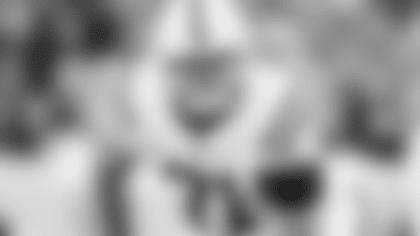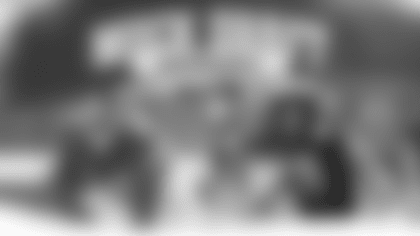INDIANAPOLIS — Indianapolis Colts defensive line coach Brian Baker recently sat down for a Colts.com 1-on-1 interview. What are his thoughts on making the transition back into the professional ranks after spending some time at the college level, DeForest Buckner's impact, Justin Houston's success and more?
Here is that interview in its entirety, which you can also listen to above:
How have your first few months on the job been for you, and how as it been working with guys like Matt Eberflus and Frank Reich?
Baker: "Well, the fortunate part of that phase of all of this is that it's really kind of just becoming re-acquainted. Matt and I worked together at Dallas, back before I left there, and we had a good relationship, period, in a lot of areas, but also working relationship from a football standpoint. And we've kept our relationship going since then, albeit not necessarily from a football standpoint. And then Frank and I, obviously we've known each other since we were 18, and got reacquainted towards the end of his NFL career as a player when he was our backup quarterback at Detroit, and I was coaching on the staff then. And then we kind of kept in touch when he was thinking about going into coaching. And then when he became a coach, and there were actually a couple of opportunities during that period between then and now where, heck, at one time I thought I was going to maybe have an opportunity and have him join me. And obviously, him having an opportunity and me being with him, and then when this came up, it worked out for me and I got a chance to be with him. So, I mean, tremendous respect; I have an absolute friendship with those two guys. So, that part of it was easy."
You come directly from the college game at Alabama, and I know you have a lot of NFL experience on your résumé, as well. But how did your time in the SEC help the way you coach, and what's the biggest difference between major college football and the NFL, despite having elite players at both levels?
"What I learned, for me in college and being able to transition to pro, is that being in the pros for 19 years before going back to college — well, actually it was a 20-year gap — gave me a perspective on what new collegiate athletes are going through in their process of being college athletes, but in also, and more revealing, the process of the recruiting. Even what, in some cases, middle school and the camps and all that kind of stuff — these kids are getting a tremendous amount of attention, particularly SEC quality kids, a tremendous amount of attention in high school and, like I said, in some cases, even middle school. And with that attention, they're getting a lot of pressure and, in my opinion, undue responsibility where you got grown folks kind of tying their line on these kids and hoping these kids kind of pull them out of impoverished situations or situations that they feel like fame and fortune may pull them out of. And that's a tremendous amount of responsibility for a kid that is really just trying to have fun playing a game. But it is what it is; that's their reality. So understanding that gave me a better opportunity to understand them. And I'm not talking about all of them, I mean, but I feel comfortable in saying that because of the attention put on college recruiting now, and obviously that means how it's affecting high school football players, I do feel comfortable saying that in some level, the attention has put undue pressure on virtually all of them. I mean, it's been incredible. So, now when all of a sudden they come to the league, OK, and they get to the first part of that expectation and now, OK, 'Hey, I've made it through college and I'm an NFL player,' then you've got a couple of different ones. You've got a few of those guys that weren't derecruited when they were in college — in other words, they still think the sun shines on their butts and that they're the center of the universe — and then you've got some other ones that are just so desperate because of the pressure put on them that they can't really sit and focus on what they need to do either. So you've got distractions that weren't always the case 30 years ago or 25 years ago, when I first got into the league. It was different. So having a feeling for that, it gives me a better opportunity to kind of go to where they are and kind of help them navigate those waters, because now I understand what those waters are, which before I didn't. And I think it gives me a better opportunity to reach him and teach him. So that's the value.
The difference is, like you say, both situations have — especially relative to college and the pro both — you've got elite football players in the room. The big difference is the age difference. Where in pro ball, I mean, I've been in rooms where I've had 33-, 34-, 35-year-olds in the same room as 22-year-olds. And you've got the same responsibility to all of them. So again, you've got to give everybody what they need, understanding some need a little less than the others, while not being a distraction to either end of it. As you're teaching graduate school ball to one set of guys, you don't want to leave the other guys behind, and nor do you put the other guys to sleep while you're teaching grade school ball to the younger ones. So, you got all those variances, but that's the challenge of pro ball, and I enjoy those challenges."
What went through your mind when you found out the team was acquiring DeForest Buckner?
Baker: "Well, I can tell you what went through my feet: electricity, man. I mean, I was about to blow up and explode out of my chair then. I was real excited because I tell you, I didn't have a great feel for who DeForest was before I started looking at some of his defensive line mates who, there were a number of those guys available in free agency, and I had to evaluate those guys. And I just kept seeing this big old 99 run around, man, just make plays and just impact and impose as well, and I'm like, 'Man, this kid is really a good player,' I mean, almost to a point where I had to like focus, I had to like really lock in on the other guys because he was a distraction. Because he was doing some things that I really like, not only his disruption and his production, but just how he was doing it. He was my style of player, you know what I mean? I mean, every coach has kind of a, 'Ah, man, I like the way this guy plays,' and you know, kind of Baskin Robbins: well, he was my kind of flavor, you know what I mean? But at the time, I didn't know. I mean, he wasn't on the list. He wasn't a free agent. So, like I said, I had to concentrate on the other guys. So when the idea came up and it was kind of thrown at me, because I was out of the loop on that one: 'Hey, wouldn't it be great to get the DeForest Buckner?' kind of, 'Ha, ha, ha,' and I'm like, 'Yeah, it would be.' …
It'd be nice to hit the lottery, too.
Baker: "Yeah, yeah. Exactly, exactly, exactly. Same. That's kind of the way it was presented. So when they told me before it was released that we were actually going to do it, I was really, really excited."
If we're talking about the domino effect that Buckner can potentially have, how is he going to help the other layers of the defense?
Baker: "Well, I mean, the first domino effect is how he's going to affect our room. Since signing him, I've done some homework and I've had guys reach out, and everybody just raves about him as a man. His work ethic, his leadership, his accountability, him as a teammate and as a D-line mate, all of those attributes added to the fiber and the personality of the D-line. And so that's the first one. And then along with him being able to hold that point down, gives us the opportunity to move a guy like Denico Autry around and find out where he'll be best fit, because he's got a very versatile skill set, gives us a chance to kind of lock and load on a young player, a younger ascending player in my opinion, with Grover Stewart, and then Sheldon Day being a part of that mix too, and Sheldon's very versatile and smart, really smart, and he's so excited about being able to play back at home and making an impact there. And Sheldon's going to be very much part of the competition, so to have him in there too. But in this defense, it all starts around those interior players. So to have a guy like him being able to be disruptive, him being DeForest, being able to be disruptive inside, obviously will give those young linebackers a chance to run around and make plays. And obviously the pressure we can apply on the quarterback with the whole unit, not just him, it gives our secondary a chance to take the ball away. And that's no different than any other defense any other place in the world. I mean, if you got a good defensive front, you got a chance to have a really good defense."
After seeing Justin Houston and being with him virtually so far this offseason, what are your first impressions of him at this stage in his career and what he's been able to rack up on his resume so far?
Baker: "Well, again, I'm not really a result-oriented guy, Matt. And I do appreciate that question, but I'm not a result-oriented guy. When I look at players, I don't really look at numbers until kind of after I evaluate them. I look at how are they producing? What are they doing to stop the ball from moving forward? And in Justin's case, he's a very efficient football player. I mean, he's a guy — and I've known about Justin because I've actually used Justin as an example of an efficient pass rusher; he takes really precise what I call rush angles, meaning his path to the quarterback, and his timing and feel for blockers and his awareness of the quarterback in the pocket. I mean, he does. And it's great because as he's getting a little older, the way he plays is not as skillset reliant as maybe some other guys that I've been around that have been just exceptionally twitchy., and then all of a sudden they lose their twitch, and their skill and their production falls off. Well, Justin is an efficient guy. So what he does and what he'll continue to do, which means he gets better at it, are things that should translate into production for the foreseeable future. There are some things that he and I have talked about that would be tweaks, you know, 'Hey, think about this and this situation, this and that.' And then me asking him, 'What are you thinking about here? Why are you doing this a little differently?' So we've had some pretty good conversations, albeit virtually, looking at tape. So we're getting a feel for each other. Justin kind of did his homework on me when I got the job. A few of his buddies that I've coached reached out to me and said, 'You know, Houston called me about you, and this was the thing.' And that's common. …
That's awesome.
Baker: "Yeah, that's common. Trust me, players want to know who's coaching. … Yeah, they really do. Because they would come into it, OK, 'Hey, I'm going to listen to this guy or I'm not.' And it goes back to, as coaches, particularly in the NFL, we have to create an environment of learning. We have to have their permission to coach them. We really do. So I think the time spent virtually and then, again, Justin having a feel for me through some of his associates, I think has helped our relationship."
Kemoko Turay is somebody the front office is very high on with his potential, because he's got those great physical tools. From your perspective, what's needed from him to really take that next step in 2020 after playing in only five games last year? But in those five games, he really flashed at times.
Baker: "He really did. I call him Kemo. Kemo is a young player, and like every other young player in the history of ball, repetitions help them. So just time on the grass, experiences that you can't necessarily simulate in practice because of the intensity, adrenaline, speed of it. Good and bad experiences are all learning opportunities for young players to develop. And obviously him being injured took away those learning opportunities on the field in practice and those learning opportunities in the game. So, short answer to your question, what's going to help him get better? He needs to be on the field. You know, he just needs to play. He needs to stay healthy, because you're right, he does have a skillset that gives him an opportunity to get the quarterback."














